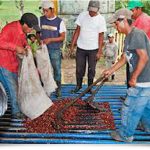Arabica Vs. Robusta: Meet the Two Main Types of Coffee
If you’re looking for a great cup of coffee, you may be amazed by all the different varieties that exist. In fact, you may find yourself wondering what they are, and what the differences are. Those of us at PT RAAS are experts in coffee, exporting coffee from around the world and connecting it with consumers who love their specialty and commercial blends. But did you know there are really only two “main” types of coffee that you will typically encounter for drinking? That’s right, most of your coffee tends to be either Arabica or Robusta—and understanding the differences between the two can help you choose the best for your cup.
Flavor
Arabica beans are known for their soft, sweet, nearly fruity taste that has prominent undertones of sugar and berries. They produce a slightly higher acid content in the coffee. On the other hand, Robusta beans have a strong, robust taste, sometimes with a grain or peanut flavor. Most Robustas contain plenty of caffeine—up to twice that of most Arabicas.
Location
Robustas are grown only in the Eastern Hemisphere, typically coming from Africa and Indonesia. They grow rather easily and can tolerate lower altitudes. Robustas are not as vulnerable to pests or weather changes, and grow fruit quickly. On the other hand, Arabicas are more picky, requiring higher altitudes and taking several years for a tree to mature and produce fruit.
Price
Due to the growing challenges of Arabic coffee, it is typically more costly than Robustas. However, the best coffees will be the specialty or premium blends, and this should have the greatest effect.
Use
Arabica coffee is often considered higher quality, as it is both a lighter flavor and more difficult to come by. However, a good robusta is a must for producing the deep flavor and heavy crema of a perfect espresso. It comes down to personal preferences at the end, so make sure to sample plenty of different types of coffees until you find the perfect one.



